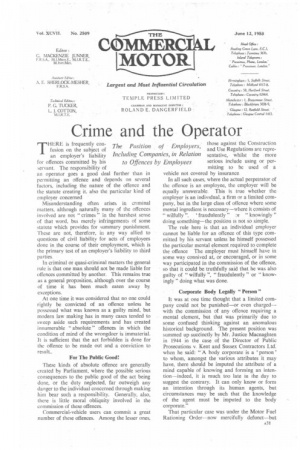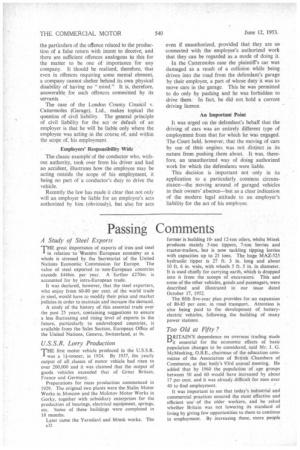Crime and the Operator T HERE is frequently eonfusion on the
Page 33

Page 34

If you've noticed an error in this article please click here to report it so we can fix it.
subject of an employer's liability for offences committed by his servant. The responsibility of an operator goes a good deal further than in permitting an offence and depends on several factors, including the nature of the offence and the statute creating it. also the particular kind of employer, concerned Misunderstanding often arises in criminal matters, although naturally many of the offences involved are not " crimes" in the harshest sense of that word, but merely infringements of some statute which provides for summary punishment. These are not, therefore, in any way allied to questions of civil liability for acts of employees done in the course of their employment, which is the primary test of an employer's liability to third parties.
In criminal or quasi-criminal matters the general rule is that one man should not be made liable for offences committed by another. This remains true as a general proposition, although over the course of time it has been much eaten away by exceptions.
At one time it was considered that no one could rightly be convicted of an offence unless he possessed what was known as a guilty mind, but modern law making has in many cases tended to sweep aside such requirements and has created innumerable " absolute " offences in which the condition of mind of the wrongdoer is immaterial. It is sufficient that the act forbidden is done for the offence to be made out and a conviction to result..
For The Public Good: These kinds of absolute offence are generally created by Parliament, where the possible serious consequences to the public good of the act being done, or the duty neglected, far outweigh any danger to the individual concerned through making him bear such a responsibility. Generally, also, there is little moral obliquity involved in the commission of these offences.
Commercial-vehicle users can commit, a great number of these offences. Among the lesser ones, those against the Construction and Use Regulations are representative, whilst the more serious include using or permitting to be used of a vehicle not covered by insurance In all such cases, where the actual perpetrator of the offence is an employee, the employer will be equally answerable. This is true whether the employer is an individual, a firm or a limited company, but in the large class of offence where some mental ingredient is necessary—where it consists of " wilfully ". ' fraudulently " Dr "knowingly " doing something—the position is not so simple.
The rule here is that an individual employer cannot be liable for an offence of this type committed by his servant unless he himself possessed the particular mental element required to, complete the offence The employer must himself have in some way connived at, or encouraged, or in some way participated in the commission of the offence, so that it could be truthfully said that he was also guilty of " wilfully ", " fraudulently " or " knowingly " doing what was done.
Corporate Body Legally " Person " It was at one time thought that a limited company could not be punished—or even charged--with the commission of any offence requiring a mental element, but that was primarily due to some confused thinking against an anomalous historical background. The present position was summed up succinctly by Mr. Justice Macnaghten in 1944 in the case of the Director of Public Prosecutions v. Kent and Sussex Contractors Ltd. when he said: "A body corporate is a ' person ' to whom, amongst the various attributes it may have, there should be imputed the attribute of a mind capable of knowing and forming an intention—indeed, it is much too late in the day to suggest the contrary. It can only know or form an intention through its human agents, but circumstances may be such that the knowledge of the agent must be imputed to the body corporate."
That particular case was under the Motor Fuel Rationing Order—now mercifully defunct—but the particulars of the offence related to the production of a false return with intent to deceive, and there are sufficient offences analogous to this for the matter to be one of importance for any company. It 'Should be realized, therefore, that even in offences requiring some mental element, a company cannot shelter behind its own physical disability of having no " mind." It is, therefore, answerable for such offences committed by its servants The case of the London County Council v. Cattermoles (Garage), Ltd., makes topical the question of civil liability. The general principle of civil liability for the act or default of an employer is that he will be liable only where the employee was acting in the course of, and within the scope of, his employment.
Employers' Responsibility Wide The classic example of the conductor who, without authority, took over from his driver and had an accident, illustrates how the employee may be acting outside the scope of his employment, it being no part of a conductor's duty to drive the vehicle.
Recently the law has made it clear that not only will an employer be liable for an employee's acts authorized by him (obviously), but also for acts even if unauthorized, provided that they are so connected with the employee's authorized work that they can be regarded as a mode of doing it.
In the Cattermoles case the plaintiff's car was damaged as a result of a collision while being driven into the road from the defendant's garage by their employee, a part of whose duty it was to move cars in the garage. This he was permitted to do only by pushing and he was forbidden to drive them. In fact, he did not hold a current driving licence.
An Important Point It was urged on the defendant's behalf that the driving of cars was an entirely different type of employment from that for which he was engaged. The Court held, however, that the moving of cars by use of their engines was not distinct in its nature from pushing them about. It was, therefore, an unauthorized way of doing authorized work for which the defendants were liable.
This decision is important not only in its application to a particularly common circumstance—the moving around of garaged vehicles in their owners' absence—but as a clear indication of the modern legal attitude to an employer's liability for the act of his employee.




































































































